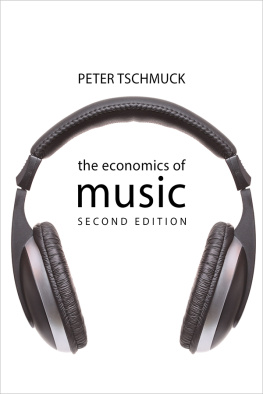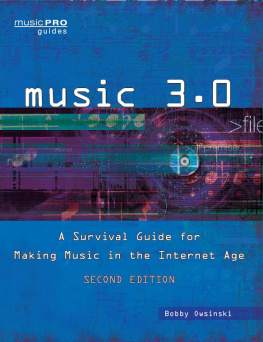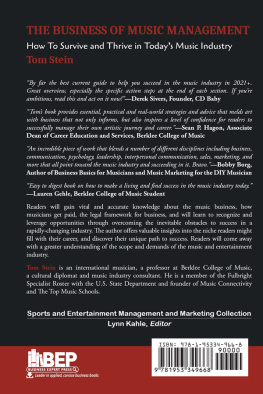THE ECONOMICS OF MUSIC
The Economics of Big Business
This series of books provides short, accessible introductions to the economics of major business sectors. Each book focuses on one particular global industry and examines its business model, economic strategy, the determinants of profitability as well as the unique issues facing its economic future. More general cross-sector challenges, which may be ethical, technological, or environmental, as well as wider questions raised by the concentration of economic power, are also explored. The series offers rigorous presentations of the fundamental economics underpinning key business sectors suitable for course use and a professional readership.
Published
The Economics of Airlines, Second Edition
Volodymyr Bilotkach
The Economics of Arms
Keith Hartley
The Economics of Construction
Stephen Gruneberg and Noble Francis
The Economics of Fishing
Rgnvaldur Hannesson
The Economics of Music, Second Edition
Peter Tschmuck
The Economics of Oil and Gas
Xiaoyi Mu
THE ECONOMICS OF MUSIC
Second Edition
PETER TSCHMUCK

Peter Tschmuck 2017, 2021
This book is copyright under the Berne Convention.
No reproduction without permission.
All rights reserved.
First published in 2017 by Agenda Publishing
Second edition 2021
Agenda Publishing Limited
The Core
Bath Lane
Newcastle Helix
Newcastle upon Tyne
NE4 5TF
www.agendapub.com
ISBN 978-1-78821-426-1 (hardcover)
ISBN 978-1-78821-427-8 (paperback)
British Library Cataloguing-in-Publication Data
A catalogue record for this book is available from the British Library
Typeset by Newgen Publishing UK
Printed and bound in the UK by CPI Group (UK) Ltd, Croydon, CR0 4YY
CONTENTS
When Steven Gerrard from Agenda Publishing invited me to write a book on the economics of the music business, he preached to the choir, as I had already outlined such a topic. His inquiry, then, was just the trigger I had been waiting for to start writing The Economics of Music, a long overdue project. Digitization has revolutionized the music business in unprecedented ways. New business models have emerged, whereas old ones have disappeared. New economic principles have emerged as a result of the structural changes undergone by the industry. Digitization has unveiled that music is a public good with positive externalities and incentives to free ride. The relation between the different music industry sectors recording, publishing and live performance has changed and new players have entered the markets. Whereas the recorded music industry has severely suffered from the digital paradigm shift, music publishing and the live music sector have benefitted from new business opportunities. The economic relevance of secondary music markets such as digital media, branding, sponsoring and merchandising have increased, providing additional revenue sources for labels, publishers and musicians. However, the artistic labour market has also been reconfigured, forcing musicians to search for new revenue streams due to the decline of the recorded music industry. The relevant literature has thus far not accounted for these large-scale changes affecting the music industry as it transitions from a physical to a digital world. By explaining the economic rules driving the digital music business today, this book aims to fill this gap.
Such a book project is always a challenge and demands support from different sides. Thus, I would like to thank Steven Gerrard at Agenda for providing a perfect publishing platform. As in the years before, Marco Abel has helped to edit my English by proof-reading the manuscript and suggesting valuable ideas for improvement. To focus on writing a book one also needs a laid-back environment. Thus, I would like to thank my wife, Magdalna and my daughter, Cornelia, for having been considerate of my writing process and for supporting me in overcoming difficulties. I dedicate this book to them with love.
Peter Tschmuck
In November 2019, my publisher informed me that my book The Economics of Music had become prescribed reading on a number of music management courses and suggested a second edition. I readily accepted the offer and agreed to update and revise the book chiefly because the ongoing process of digitization had caused profound changes in the music business since 2017 when the first edition was published. The publishers request came just before a mutated SARS virus was transferred from animals to humans in the Chinese province of Wuhan triggering the worst global pandemic in a hundred years.
Although the long-term effects on the music industry of the pandemic-related social distancing and lockdown measures taken by governments in all parts of the world cannot be determined yet, it is clear that the cancellation of live music events and the closure of music venues around the globe wont be without significant consequences for the actors in the music industry. I therefore faced the challenge of analysing the impact of the pandemic on sectors of the music industry and its main players on the basis of the limited amount of data available.
Hence, I have conducted a kind of action research evaluating the continuous flow of news of concert cancellations and postponements as well as financial support measures for the music economy from governmental bodies and other institutions to avert disaster, especially for the economically significant live music sector. It might be the task of a third edition in several years time to assess the full impact of the Covid-19 pandemic on the music ecosystem.
Currently, I am sitting here in Vienna in the countrys third period of lockdown hoping that a vaccine will set us on the road to reopening restaurants, bars and cafes and for live music once again to be enjoyed by thousands of fans without fear of contracting a microscopic virus.
Peter Tschmuck
Vienna
January 2021
Tables
Figures
Music industry, music economy, music business
If you google the term music industry the following Wikipedia entry tops the search list:
The music industry consists of the companies and independent artists that earn money by creating new songs and pieces and organizing live concerts and shows, audio and video recordings, compositions and sheet music, and the organizations and associations that aid and represent music creators. Among the many individuals and organizations that operate in the industry are: the songwriters and composers who create new songs and musical pieces; the singers, musicians, conductors and bandleaders who perform the music; the companies and professionals who create and sell recorded music and/or sheet music (e.g., music publishers, music producers, recording studios, engineers, record labels, retail and online music stores, performance rights organizations); and those that help organize and present live music performances (sound engineers, booking agents, promoters, music venues, road crew).
This definition is a list of music industry actors. However, this listing does not tell us anything about the processes and structures of the music industry. The Oxford Music Online entry provides a more general and process-oriented definition of the music industry: The music industry consists of a network involving the production, distribution, dissemination and consumption of music in a variety of forms, as well as the promotion of live music performances (Tschmuck ).









